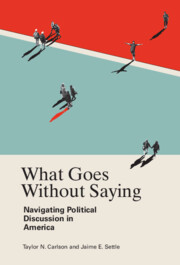Book contents
- What Goes Without Saying
- What Goes Without Saying
- Copyright page
- Contents
- Figures
- Tables
- Acknowledgements
- 1 Opening the Black Box of Political Discussion
- 2 The 4D Framework of Political Discussion
- 3 Data Collection
- 4 Detection
- 5 Decision
- 6 Discussion
- 7 [further] Discussion
- 8 Determination
- 9 Individual Dispositions and the 4D Framework
- 10 The Costs of Conversation
- Notes
- Works Cited
- Index
2 - The 4D Framework of Political Discussion
Published online by Cambridge University Press: 26 May 2022
- What Goes Without Saying
- What Goes Without Saying
- Copyright page
- Contents
- Figures
- Tables
- Acknowledgements
- 1 Opening the Black Box of Political Discussion
- 2 The 4D Framework of Political Discussion
- 3 Data Collection
- 4 Detection
- 5 Decision
- 6 Discussion
- 7 [further] Discussion
- 8 Determination
- 9 Individual Dispositions and the 4D Framework
- 10 The Costs of Conversation
- Notes
- Works Cited
- Index
Summary
In Chapter 2, we outline the theoretical core of our inquiry. To fully understand the experience of political discussion, we must think more broadly about the full set of considerations that structure people’s decisions. We introduce the concept of the 4D Framework to the process of political discussion, articulating what happens at each of four stages preceding, during, and after the opportunity to discuss politics. The stages include Detection, Decision, Discussion, and Determination. Individuals make choices at each stage of the cycle as a result of their unique individual dispositions and the social context, both of which contribute to unique motivations. To rigorously examine the motivations behind political discussion preferences, we develop the AAA Typology, which characterizes motivations as accuracy, affiliation, and affirmation. We argue that in contrast to previous research emphasizing instrumental goals in political discussion (i.e. to learn more information, an accuracy goal), most individuals are driven to preserve their self-esteem (affirmation) and the social ties with their potential discussants (affiliation).
Keywords
- Type
- Chapter
- Information
- What Goes Without SayingNavigating Political Discussion in America, pp. 20 - 43Publisher: Cambridge University PressPrint publication year: 2022



